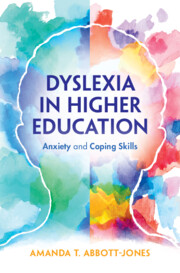
-
Select format
-
- Publisher:
- Cambridge University Press
- Publication date:
- 21 October 2021
- 04 November 2021
- ISBN:
- 9781009032162
- 9781316517000
- 9781009016889
- Dimensions:
- (229 x 152 mm)
- Weight & Pages:
- 0.62kg, 324 Pages
- Dimensions:
- (229 x 152 mm)
- Weight & Pages:
- 0.48kg, 150 Pages
- Subjects:
- Psychology, Cognition, Educational Psychology
You may already have access via personal or institutional login- Subjects:
- Psychology, Cognition, Educational Psychology
Book description
People can best help dyslexic students once they understand dyslexia's association with anxiety and effective coping strategies, both cognitively and emotionally. By highlighting the perspectives of dyslexic students, this book evidences the prevalence of anxiety in dyslexic communities. The shared experience from a range of dyslexic learners pinpoints best practice models and helps combat the isolation felt by many with learning difficulties. The author targets academic areas where students struggle, offering techniques to overcome these barriers. Such obstacles are not always due to cognitive factors but may be associated with negative experiences, leading to fear and uncertainty. Recounting these sticking points through student voices, rather than from a staff viewpoint, enables readers to find meaningful solutions to dyslexia-related problems. Through this dynamic methodology, the book shows researchers and practitioners how to understand dyslexic needs on an emotional level, while presenting dyslexic readers with practical coping methods.
Awards
Winner, 2022 Choice Outstanding Academic Titles
Reviews
‘This book is a significant step forward in understanding the complex relationship between dyslexia, anxiety and coping in higher education. It moves beyond documenting the association to investigating effective and ineffective coping strategies. It does this through careful investigation of the lived experience of students with dyslexia, and use of theoretical frameworks of dyslexia and anxiety.’
Julia Carroll - Professor at the Centre for Global Learning, Education and Attainment, Coventry University, UK
‘This book is a welcome contribution to the literature highlighting the challenges dyslexic students face at university, both academic and emotional. It is empirically based, relying on both quantitative and qualitative evidence, providing a wealth of detail about the nature of the experience and suggestions as to how these difficulties might be mitigated through coaching, counselling and technological interventions.’
David McLoughlin - Professor of Professional Practice in Psychology, University of Buckingham, UK
‘This is a most useful book that explains the nature of dyslexia and provides practical guidance on how to support students with dyslexia in higher education.’
Mark Taylor - Senior Lecturer in Information Systems, Liverpool John Moores University, UK
‘This book fills an important gap in our understanding of dyslexia in adulthood, exploring the emotional consequences of dyslexia in adults from their own perspective. Linking to and extending theories of coping, it translates these voices into practical strategies for managing study which acknowledge not only the cognitive challenges but also the very tangible emotional responses.’
Jane Hurry - University College London, UK
‘Amanda T. Abbot-Jones’ book will be extremely useful to anybody wanting to grasp the current state of play regarding dyslexia in higher education, including legislation, institutional provision disparities, available support and the ways in which dyslexic students struggle both cognitively and emotionally.’
Nigel Rodenhurst Source: ADG FE/HE, Dyslexia Review
‘… an excellent overview of what research has uncovered so far and what still needs to be accomplished. This book can be part of the recommended regarding list for taught programmes such as the postgraduate programmes in HE teaching.’
Georgia Niolaki Source: Patoss Bulletin
Contents
Metrics
Altmetric attention score
Full text views
Full text views help Loading metrics...
Loading metrics...
* Views captured on Cambridge Core between #date#. This data will be updated every 24 hours.
Usage data cannot currently be displayed.
Accessibility standard: Unknown
Why this information is here
This section outlines the accessibility features of this content - including support for screen readers, full keyboard navigation and high-contrast display options. This may not be relevant for you.
Accessibility Information
Accessibility compliance for the PDF of this book is currently unknown and may be updated in the future.


